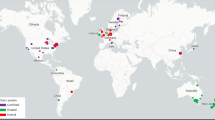Abstract
IN the past, material for the estimation of the wastage and losses in farm livestock has been collected from the records obtained from survey farms. Another source of valuable information on the question can be obtained from the knackeries which are found in most livestock areas in Great Britain. A West Wales knackery was able to supply a full record of the intake for four years 1942–45 with particulars of the date, source and description into the following categories: cows, horses and other cattle (bulls, steers and heifers). The smaller farm animals—calves, sheep and pigs—were not collected by the knackery as they were considered too small to cover transport costs. This knackery has a collecting area of roughly twenty miles radius. The examination of the records show that a total of 3,116 animals (30 per cent of them alive) was collected during the four years. The following table gives the details of the annual intake for each year.
This is a preview of subscription content, access via your institution
Access options
Subscribe to this journal
Receive 51 print issues and online access
$199.00 per year
only $3.90 per issue
Buy this article
- Purchase on SpringerLink
- Instant access to full article PDF
Prices may be subject to local taxes which are calculated during checkout
Similar content being viewed by others
Author information
Authors and Affiliations
Rights and permissions
About this article
Cite this article
PHILLIPS, R. Losses and Wastage in Farm Livestock. Nature 157, 809–810 (1946). https://doi.org/10.1038/157809c0
Issue Date:
DOI: https://doi.org/10.1038/157809c0
Comments
By submitting a comment you agree to abide by our Terms and Community Guidelines. If you find something abusive or that does not comply with our terms or guidelines please flag it as inappropriate.



